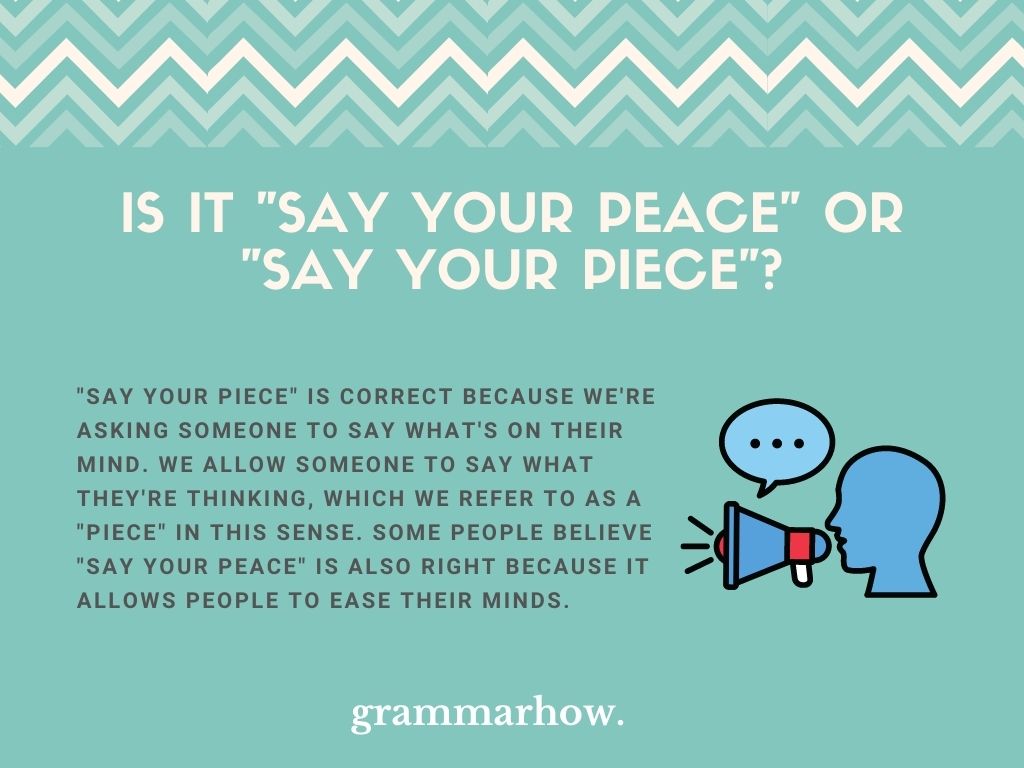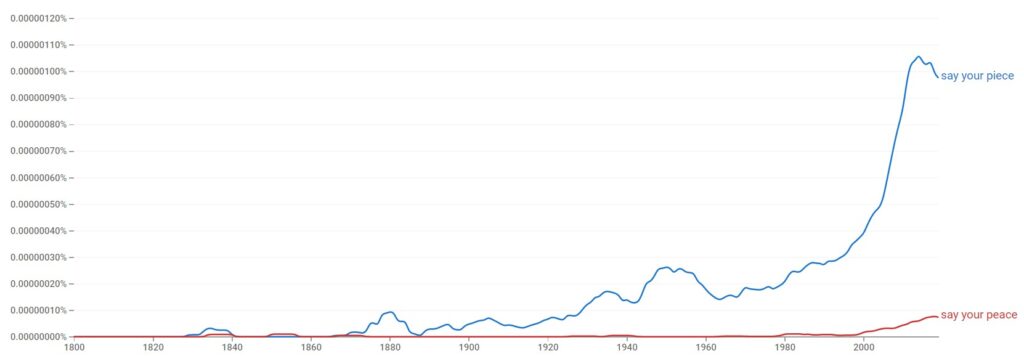Making sure we use the correct words in a saying is important when you’re writing idioms in English. The difference between “say your peace” and “say your piece” highlights this problem. While they sound identical, they mean different things, and only one saying is considered correct.
Which Is Correct: “Say Your Peace” Or “Say Your Piece”?
“Say your piece” is correct because we’re asking someone to say what’s on their mind. We allow someone to say what they’re thinking, which we refer to as a “piece” in this sense. Some people believe “say your peace” is also right because it allows people to ease their minds.

The definition of “say your piece” according to The Cambridge Dictionary is “to say what you are obviously wanting to say.” This means that it’s clear to other people that you’re desperate to say something, and they are giving you a chance to say it before they move on.
You can also look at this graph to see the major differences in usage in literature between the two sayings. Clearly, “say your piece” is the most common choice in all forms of writing.

That’s not to say that “say your peace” doesn’t get used every now and then, but it’s nowhere near as common and is almost always used as a mistake of the original “say your piece” rather than an actual grammatically correct sentence.
Arguments Why “Say Your Peace” Is Correct
There are some arguments for people using “say your peace,” and if you think about them, then you might realize why some people believe “say your peace” to be correct.
When asked to “say your piece,” it’s usually to clear your mind and get something off your chest in the situation. Allowing some to ease their mind links closely with a feeling of “peace,” which is why people believe this is the correct saying.
Of course, the saying isn’t actually correct, and we shouldn’t use “peace” in this manner. Still, this is the main reason why so many people believe it to be correct.
There’s a similar saying that is “hold your peace” or “speak your peace,” which means that someone is allowed to say something in a situation to ease their mind. It’s potentially because of these sayings as well that many people believe “say your peace” is correct.
Most of the arguments for or against why one of these sayings is correct is more closely associated with the use of homophones. Both “piece” and “peace” sound identical when you say them aloud. It’s only when they’re written down that you can properly see their spelling differences and treat them as different words.
Since, in the case of these sayings, both words are close enough to be correct, it’s no surprise that people believe both sayings to be right.
Arguments Why “Say Your Piece” Is Correct
There are also arguments for why “say your piece” is correct. Of course, in this sense, “say your piece” is correct, so technically, no arguments need to be made. Still, it’s good to understand why we use “piece” over “peace” in this sense.
When using “say your piece,” we’re asking somebody to “speak their mind.” The aim is to allow them to get whatever they’re thinking about out of their head and into the room to discuss it further.
Sometimes, people can be anxious to “say their piece,” which is why people think “peace” works better. Since “saying your piece” makes you reveal what’s on your mind, it’s almost like your mind is eased.
However, in this sense, we’re using “piece” as the thing that we want to get across to other people. “Piece” could be anything from a simple thought, to an abstract concept, to a conversation that someone would like to have with another person.
What Does “I Said My Peace” Mean?
The next phrase we should look at is what generally comes after somebody asks you to “say your piece.” We want to come up with a decent response once the “piece” has been said.
We say, “I said my peace,” after we’ve finished discussing whatever was on our minds. That way, people know that we’ve finished making the point that we wanted to get across, and we’ve eased our minds.
Again, “peace” isn’t the correct spelling here. We should make sure to actually write “I said my piece” when we write about it in this way. It’s because we’re talking about the “piece” of information that we had in our minds that we wanted to share with people.
Since the saying is well-known as “say your piece,” the opposite reply to something like that would be “I said my piece” as well.
Sometimes, you don’t have to be prompted to say your piece either. If you’d rather just come out with some response to what people are saying, you can use “I said my piece” in this way. It’s also a common thing for people to say after telling somebody else off or scolding them for one reason or another.
- How dare you act like that in front of my family! Now, what am I supposed to tell them about you? I said my piece; now what have you got to say.
This is a good example of when we’ll use “I said my piece” to tell someone off. We typically say all the problems that we have with them and only end our trail of thought with “I said my piece” once we’re certain we’re done.
This example also shows us why it’s better to spell it “piece” than “peace.” There isn’t much we’re easing ourselves of here for “peace” because we’re telling somebody off.
What Does It Mean To “Hold Peace”?
There’s another saying that people use that’s known as “hold peace” or “hold your peace.” It’s the most likely reason why so many people confuse “say your peace” as the correct spelling, but it actually has a completely different meaning.
“Hold peace” means that you should keep quiet about whatever is on your mind. Even if saying those things will ease your mind, it’s better left unsaid. It applies to situations where saying anything might cause further complications.
We usually have to tell someone else to “hold their peace.” For example, if we’ve just made an important announcement at work, but we’re not ready to take any questions about it, then it’s likely that we’ll say “hold your peace” to everybody we’re addressing to make sure they don’t complain about things that can’t be changed.
The sentence is used as a way of telling someone that no matter what they think they have to say, it’s not worth saying it because it won’t do any good for the situation.
Example Usage
Now let’s go through some examples of using the various sayings in sentences. We’ll include a good range of them to make sure you’ve seen all that you can when we’re using these sayings.
- I can see that you have something very important to say. Speak your peace now, or we’ll move on.
- I think you should say your peace, even though this isn’t the situation to do so.
- Okay, I’ve said my peace, and now it’s time for you to tell me what you think.
- There’s no need to comment on any of these decisions, as they’re all final. I encourage you to hold your peace.
- I said my piece, and there’s not much else for me to do. If you have anything to say, you know where to find me.
- Why can’t we all just say our piece and be done with it? It won’t take long if you just hear us out.
- I can see something is eating away at you, Jenkins! Why don’t you say your piece and let us decide what to do?
- Hold peace until we can determine whether there’s anything we can do to remedy this situation.
- I didn’t ask you to say your piece. You only did it because you thought it would be useful. Hold your piece next time.
As you can see, there are plenty of examples where we can use the sayings and plenty of variations to make the most of it.
“I’ve Spoken My Peace And Counted To Three Meaning” – Meaning And Origin
We can take the saying slightly further and look at the original saying, “I’ve spoken my peace and counted to three.”
The saying is from the 2000 movie O Brother Where Art Thou and is used after a woman has said all she needs to say about the situation. Using “counted to three” shows that she’s given the others a chance to respond, but they didn’t take it.
The full meaning shows there’s a finite number of times someone will wait before they walk away from the situation. If you don’t have a sufficient response to what they’ve said, they would rather walk away than have to deal with you again.
Just like the article we’ve shared above, the original saying is written with “piece” instead of “peace.” The idea is that she’s spoken her mind fully and was waiting for a response but didn’t end up with a good one.

Martin holds a Master’s degree in Finance and International Business. He has six years of experience in professional communication with clients, executives, and colleagues. Furthermore, he has teaching experience from Aarhus University. Martin has been featured as an expert in communication and teaching on Forbes and Shopify. Read more about Martin here.
